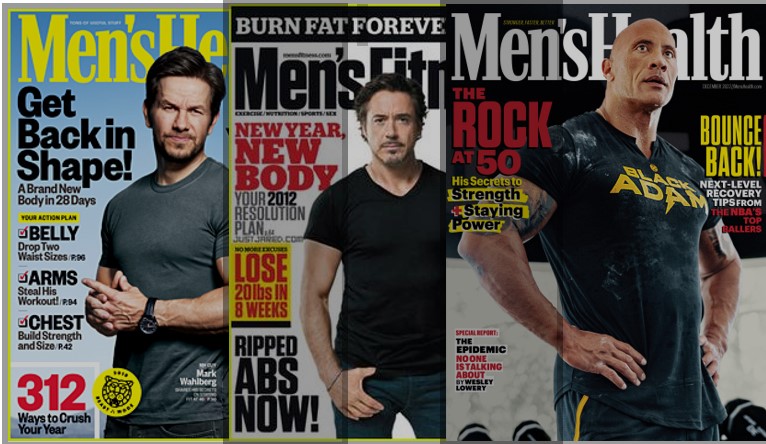
It happens all the time. I’m talking with someone about exercise in the gym and they say something along the lines of “I saw this video where the Rock was saying what he does is…”
Suppress the outward eye roll.
Our culture is obsessed with celebrities. Try to get someone to read an article about what a leading expert in nutrition or exercise science – PhD and all, 30-plus years immersed in the field – says about getting healthy and fit. Fat chance. But a celebrity? People eat that up. Our health and fitness magazines and websites have more resemblance to Entertainment Weekly than actual health publications. Headlines read “Johnny Hollywood’s Ab Routine,” “This Person (Who is Releasing a New Movie) on His Morning Habits,” “Get Arms Like This Guy Who Plays a Superhero.”
There’s so much wrong with that, it’s hard to know where to begin. We are celebrity-obsessed. And it’s not only in the fitness industry. It’s clearly a larger cultural problem. We get sucked in to the superficial. Most of us care about fame and appearance a lot more than we do about substance, accuracy, and truth. Sure, most people would say not them. But most are unconsciously lying to themselves. Maybe even you. (No? If you were, how would you know?)
I get it. Celebrities like the Rock look like fit people. They seem to know what they’re talking about. They’re often likable. And they’re often an image of what many people are striving to be. An ideal. (And I don’t mean to single out the Rock. He seems like a cool guy. Just not someone you should be getting fitness advice from.)
But is it real? Can you trust them? Unfortunately, more often than not, I think the answer is “No.”
Here’s why you shouldn’t get your fitness advice from celebrities.
This is their job. This actor’s or singer’s or wrestler’s marketing team might want you to think they are a regular person just like you. They are not. (Do you have your own marketing team?) They are rich and famous. They don’t have to get their kids ready for school or appease their demanding boss. Half of their “work” is working out… and enjoying healthy meals prepared by their nutritionist. The rest of us have work to get to and kids to raise. They are not like us.
They don’t care about your fitness. They care about promoting something. That article about your favorite celebrity’s fitness secrets or morning routine? They didn’t do it out of the kindness of their heart or to share their in-depth health knowledge. They did it to promote their new movie or TV show or album. When that celebrity has a new project to promote, their marketing team puts together a list of media outlets and content ideas for each one so they can publicize the project. They might be talking about their abs in a fitness magazine, their favorite recipes in a cooking magazine, and made-up parenting secrets in a parenting magazine. It’s glorified advertising content. It’s not information you should put a lot of stock in.
They’re likely on steroids or other drugs. These celebrities and the media conglomerates behind them have millions – sometimes billions – of dollars at stake in creating a fantasy, an illusion. And, unlike many sports leagues, Hollywood has no drug policy and doesn’t really care about the product’s integrity. It’s always funny to me to hear someone marvel about what great shape some celebrity got in for a movie role. Yeah, shocking. While it helps to be able to train morning, noon, and night, it also helps to have the best drugs on the planet available to you. And if you think celebrities who are suddenly ripped aren’t using them… well, you should be aware that the only word that rhymes with orange is gullible. But you have to say it very slowly.
That cover photo is most likely photoshopped. Those ripped abs and chiseled biceps you see on a magazine cover, they’re probably bogus. Photoshop and tricks like shading are widespread in media. Again, it’s about selling an ideal; making people buy into something they want to believe. Shock value helps. Art directors want an eye-catching cover. They want you to say “whoa.” They don’t really care about accuracy.
They won at genetics. These people are often stars because they won the genetic lottery. It isn’t that they worked out any better than anyone else, or that they ate cleaner. It’s likely they were born with certain gifts. A particular bone structure. Stunning eyes. A certain type of musculature. Really good metabolism. They aren’t smarter than anyone about health. They probably don’t work harder or sacrifice more. The reality is… they’re probably just lucky. Saying you can replicate their success by doing these three exercises (that they probably don’t even do) might sell magazines and promote their movie. But it’s probably BS.
They’re focused on appearances, not fitness. This strikes at the core of the fitness problem in our culture. We want quick, easy, painless solutions. Hacks. But we also gravitate toward the superficial. Many of us don’t really care about being “healthy” or “fit.” We really just want to look good in a bathing suit or in our Instagram photos. The problem is that’s not at all what fitness is. Fitness is about function, not form. It’s about what you can do. And your body shape isn’t necessarily indicative of your fitness. (Google photos of former UFC champ Daniel Cormier or boxing champ Tyson Fury.) Celebrities have top nutritionists controlling their diets, experts training them all day, and people giving them the best performance-enhancing drugs available. And it’s all to look a certain way. Real sustainable fitness is about being able to do things: climb stairs without getting winded, go for a hike, play tag with your kids. Functional fitness requires building a solid foundation that takes time and patience, not just a quick few months to look a certain way for a few shirtless scenes in a movie.


